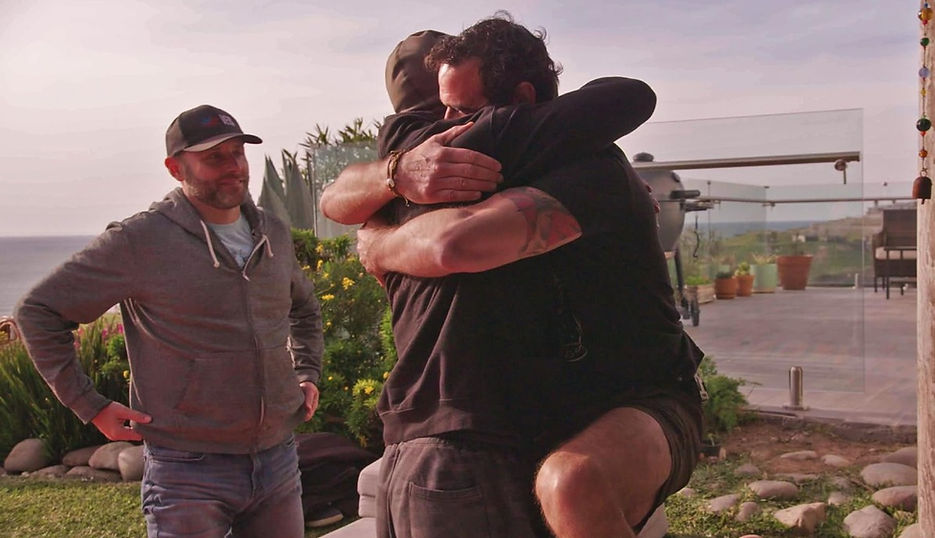In Waves and War
Critic:
Holly Baker
|
Posted on:
Oct 29, 2025

Directed by:
Bonni Cohen, Jon Shenk
Written by:
NA
Starring:
Marcus Capone, Matty Roberts, DJ Shipley
In Waves and War (2024) is an in-depth documentary on the catastrophic impact on mental health caused by PTSD in US Navy SEALs and the ways that psychedelic treatments can help them recover. Made up of a series of interviews combined with footage of the Iraq war, as well as stylised animations, this documentary provides an optimistic outlook on the medical possibilities for revolutionary drugs, which may be the answer to the disastrous PTSD which many ex-SEALs suffer from.
The film introduces its ‘brain study’, and interviewers investigate the experiences of former SEAL members and how these have shaped them. They are asked graphic, detailed questions about their experiences out in the field. The interviewees’ tone is deadpan, which viewers may find disturbing. The ex-SEALs open up explicitly about what has happened to them and how they are feeling in a detached manner, highlighting their desensitisation from the horrible things they have experienced. The men’s confessions are not dramatised; they are brief and raw, serving their purpose of providing an honest depiction of what these men have been through.
The interviews appear on smeared CCTV-like footage, enhancing the authenticity of the men’s voices. They confess their suicidal urges and disengagement from their identity, which is difficult to view due to the absolute raw honesty that comes through in their words. The ex-SEALs’ PTSD seems to have swallowed up many of their lives, so much so that they lack any sense of purpose. As the documentary goes on to explain, their trauma has not only affected them but has also strained their personal relationships almost beyond repair.
With its 1 hour and 47 minute runtime, each moment is handled carefully, providing ample context for how these men came to join the Navy SEALs, as well as the escalation of the US-Afghanistan conflict in the early 2000s. Viewers are given an insight into the way young men were disillusioned by the feeling of belonging as part of a brotherhood, unaware of the devastating impact of what they were soon to face. Many of the ex-SEALs confess that being part of the Navy was a childhood dream for them, some of them following in their father’s footsteps. They even describe their time in the army as ‘heaven’ and admit that they felt as though they were ‘where they were supposed to be’ and were ‘hungry’ to go to Afghanistan and fight for their country following the 9/11 attacks.
Providing this context is incredibly important, as it is no understatement to emphasise the role that pro-military propaganda played in the 80s and 90s. Many young men felt as though they needed to find a purpose, and they believed the army provided the most honourable one. In many cases, men did find a purpose in the military and found belonging in the meaningful friendships they made during intense training camps.
Netflix recently came out with the TV series Boots. This dramedy tells the true story of a young homosexual man who followed his best friend into joining the Marines when seeking a change in his life. The show demonstrates the way he was influenced by advertisements that mythologised the glory that the Marines would provide. Boots is set in the 1990s, around the same time many of the men shown in In Waves and War would have joined the SEALs. The way the men speak about their love for one another in In Waves and War aligns with the story told in Boots of young men finding belonging in one another. Boots also displays the terrible realities and prejudices individuals would face due to the nature of the strict regime, which In Waves and War, unfortunately, never addressed.
The Netflix drama also touches on the shocking turn of events, as what was once boot camp is soon to become a harsh, brutal war as the Iraq conflict escalates, and the boys must accept what being a Marine actually encompasses. This depicts a scenario very similar to the reality which the ex-SEALs had to deal with and, due to PTSD, always will.
The animation sequences in In Waves and War are done through an abstract style, showing the way trauma impacts the men. The PTSD the soldiers suffer with is difficult for them to describe and is also very hard to imagine for viewers who haven’t been through anything similar, so the animations help provide a pictorial expression of what they experience, whilst being vague and surrealist in style.
As the documentary comes to an end, the ex-SEALs open up about the fact that Navy trauma isn’t all they suffer from, and they describe the way their fathers were abusive towards them at a young age, leading them to see violence as a solution and their self-worth to dwindle. One interviewee states, ‘If we didn't abuse children, would we have a military?’ An insightful commentary on the way that cycles of violence reproduce in unhealthy ways, and that the system of the military relies on disturbed individuals.
The documentary describes the methods of psychedelic treatments used and presents a before-and-after, as if it were a case study. Though this may be a controversial approach, the SEALs themselves see a major improvement in their sense of self, and this drastic improvement is hopeful to see. Viewers can’t help but wonder, however, whether psychedelics are the solution or if the real solution relies on the questioning of why such violence and trauma are occurring in the first place.
On Netflix Monday, 3rd November 2025.
.png)


